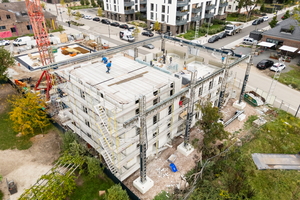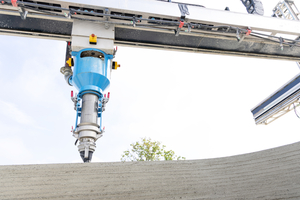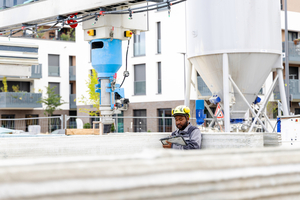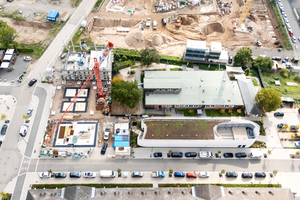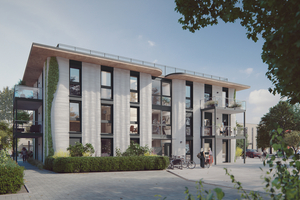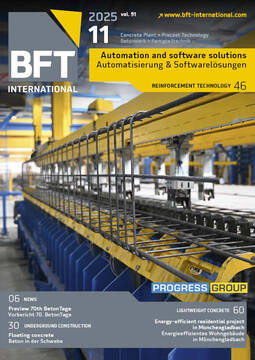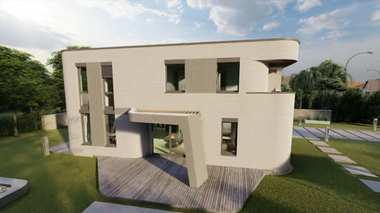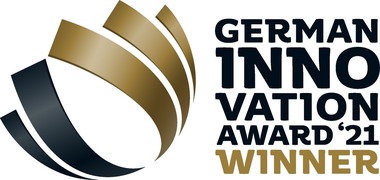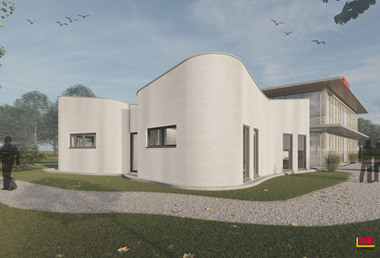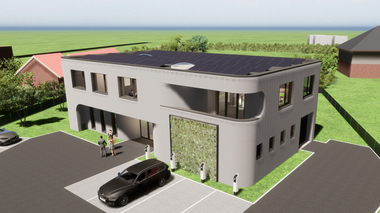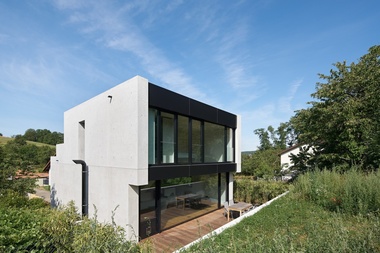Germany’s first serially produced 3D-printed residential building celebrates its premiere in Heidelberg
More house per hour, lower costs per square meter, reproducible as often as desired, with a reduced carbon footprint – and, as a building type optimized for 3D printing, available to everyone for the first time. The reference project for serial 3D-printed housing construction was presented to the public.
The so-called Dreihaus is a novelty in 3D residential building printing and a milestone that sets new standards – in terms of speed, cost-effectiveness, and, thanks to the use of carbon-captured net-zero cement for the first time in Germany, also in terms of the CO₂ footprint. With Germany’s leading experts in 3D construction printing – Peri 3D Construction, Korte-Hoffmann Gebäudedruck, Heidelberg Materials and SSV Architekten – builder Hans-Jörg Kraus completed the project in less than twelve months, from the building application to completion.
Walls created in record time with holistic 3D printing system
Peri 3D Construction used its holistic 3D construction printing system in Heidelberg and carried out the printing work on the three apartment buildings with a team of two to three people. “The 3D printer automatically follows the pre-planned paths and prints one square meter of wall in about five minutes. This is how the walls of the largest apartment building were constructed in just 26 working days,” explains Dr. Fabian Meyer-Brötz, Managing Director of Peri 3D Construction GmbH.
For the company, the significance of the project lies not only in the technology used, but also in what is being printed: “Dreihaus combines everything we have learned in our 17 3D printing projects to date. Each Dreihaus is divided into two segments: while one half is being printed, the ceiling in the other is already being concreted.”
Affordable housing for Germany
Compared to conventional construction methods, the Dreihaus can be completed about 30% faster and 10% more cost-effectively. These figures will be verified in practice, and the corresponding data will be published once the project is complete. “The Dreihaus can now be implemented as often as desired by any construction company wishing to enter 3D concrete printing. This creates a new foundation for serial construction – directly on site. With Dreihaus, residential construction from the 3D printer is entering series production,” says Dr. Meyer-Brötz.
3D residential construction now enters series production
“As part of the Peri Group, we see 3D concrete printing as a key technology for the next generation of construction. With the Dreihaus project, we are demonstrating how residential buildings can be constructed faster, more efficiently, and to a high standard of quality. For Peri, Dreihaus is not just another project milestone but an important signal: it proves that serial 3D housing construction in Germany is no longer a vision of the future, but can already be implemented,” says Christian Schwörer, CEO of the Peri Group.
Fully planned, scalable building concept
“At Korte-Hoffmann Gebäudedruck, we are proud to have developed a concept together with our partners that makes affordable, sustainable, and architecturally high-quality living space possible in the shortest time. The unique feature of the Dreihaus is its fully planned and 3D printing-optimized, scalable building concept for a three-story apartment building – available in three sizes, S, M, and L, with six to twelve residential units from 46 to 89 square meters. It is around 30% faster to complete and about 10% cheaper than a comparable conventional apartment building,” explain Waldemar Korte and Alexander Hoffmann.
“Our vision, however, does not end with planning. From 2026, we at Korte-Hoffmann Gebäudedruck will act as developers in the realization of Dreihaus projects. This means we take responsibility not only for the architecture and planning but also for the creation of urgently needed living space. For the Krausgruppe, we also adapted some details of the Dreihaus Basic to the client’s wishes in collaboration with Korte-Hoffmann Gebäudedruck,” adds Jan van der Velden-Volkmann from SSV Architekten.
Significant CO₂ reduction in building materials
Heidelberg Materials, as an expert in 3D concrete printing and the decarbonization of the construction industry, is supplying CO₂-reduced high-tech materials for the Dreihaus project. For the first two buildings, the material EvoBuild 3D Printing is used, whose binder already allows a significant reduction in CO₂ compared to conventional Portland cement.
German premiere: 3D printing with the world’s first carbon-captured net-zero cement EvoZero
In the third building, the partners are going one step further: for the first time in Germany, EvoZero from Heidelberg Materials is being used – the world’s first net-zero cement based on CO₂ capture and storage (CCS). The CO₂ reduction is achieved through innovative capture technology at the company’s plant in Norway, where the captured CO₂ is permanently stored beneath the seabed. Strict mechanisms ensure that every ton of captured CO₂ is uniquely and only once credited to EvoZero’s carbon footprint.
+“With the German premiere of EvoZero, the world’s first net-zero cement produced by CO₂ capture and storage, we are ushering in a new era of sustainable construction in Heidelberg. I am particularly pleased that, with Dreihaus, we can demonstrate how closely innovation and sustainability are linked at Heidelberg Materials,” explains Dr. Dominik von Achten, CEO of Heidelberg Materials. “In addition to the innovative Dreihaus project, we have already realized Europe’s largest 3D-printed building together with the Krausgruppe and Peri 3D Construction.”
Trial living in the boardinghouse
In spring 2026, the buildings for commercial living will be ready for occupancy. The future tenant, MyStay Scherer, will operate the boardinghouse Hei³ Apartments – Heidelberg hoch 3 as serviced apartments for companies and business travelers – and for everyone who wants to experience the Dreihaus concept firsthand during a trial stay.
CONTACT
Peri 3D Construction GmbH
Rudolf-Diesel-Straße 19
89264 Weißenhorn/Germany
+49 7309 950 6096

